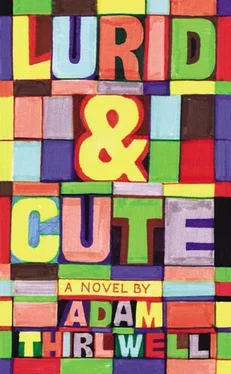— Can I interrupt? said Candy.
I was kind of glad, because I definitely was worrying that I was not expressing myself correctly, and was interested to listen to Candy always, and in particular to her theory that she now proceeded to outline, according to which we would all have to accept the possibility that the best you will ever do in imagining the suffering of other people is to imagine it as garish, with very gruesome blood effects. Whereas the real truth of suffering, in Candy’s opinion, as she described it, was so much more everyday and dull and difficult and inescapable. But that was much harder to imagine and so we tended not to do it. And I wanted very much to show that I agreed with Candy, that the lurid is the best the cute can do in imagining such suffering, and one way you can show your agreement in a conversation is to extend another person’s reasoning, and so I tried to do that. It seemed to me, I added, that the problem of what to think about should be much more personal. Like often I sit there thinking how I only have one life and do not know precisely what to do with that.
— Darling, said Tiffany. — It’s not about you.
Always, I thought, I am fated to be the one who is not understood! But still, I carried on. Here we all are, I said, in a panic about suffering, but what about death too?
— I do not see you, said Tiffany, — being currently scythed down.
— The currently , I said, — is not the point!
For I could not understand, I tried to explain, in my own private panic, at what point you can think about both suffering and death — I mean think about them equally, with equal weight. It’s like you cannot concentrate on both, and both seem worthy of my full attention. If you concentrate on the suffering, then obviously you must tender to the needs of other people. But if you concentrate on the death, and the fact that every single person in this gathering right here is going to be a corpse, and possibly very soon, then the urgency of suffering perhaps disappears, and the more imposing question is the one about you, and how much pleasure you should get before you die.
ME
Like maybe the severest question you can ask is whether you are in a happy marriage.
CANDY
You really want to talk about this?
ME
I’m only saying.
CANDY
OK then, OK.
I could see that she was smiling despite herself, and that she was possibly angry or on edge. It would have been useful to determine the precise depth of her irritation, but I felt unsure as to how to go about that, and in company. Always it’s important to be as gentle as possible with other people, and in Candy I often felt that it was also important to acknowledge this giant pressure all around her, that was not of anyone’s making. It was the atmosphere in which perhaps everyone now lives, a giant weariness — considering how many demands were being made on everyone’s time, not just developing the correct sex life and career but also needing to know the right crèche or massage place in a curious out-of-town location. How in this time will anyone ever be blissfully lazy again? And so once more I felt a tenderness for Candy that was like a burden I carried with me, and I would have liked to say this to Candy but to say it in front of all these people seemed impossible or improper, so instead I came out with something wilder and more general.
ME
I mean: what’s destitution?
CANDY
I’ll tell you what destitution is. It’s when a person is watching some daytime soap where two women are arguing over a parking space — and this spectator cannot comprehend such a situation — a situation where there are too many cars .
even if he is no expert on the subject
It wasn’t that I disagreed with our grand desire for justice — I just doubted how to change the situation. Definitely it’s noble to want to divest yourself of your colonising power, but to do this might need much more drastic schemes. To care so much about the people far away! And with such limited achievements! The problem with these kind of woes is that they’re basically as otiose as the single honest policeman inside a giant police state. Just look at me, and my utopias! Certainly if people wanted to accuse me of black crimes, I would not resist — and not only for the obvious crimes that were now occupying my conscience. To think of the money spent on my education! On the paints and paper I liked to play with, and on my toys! It just seemed natural never to think about the factories and the workers in those factories who produced such things. Most of life I think is like being in the restaurant of your dreams, where the waiters are attentive yet invisible. That’s basically how we want our world to be run, and it’s amazing to what extent it really is. You are always spared the oil extraction and other tasks. I used to be told off by my mother for telling people how easy I found everything, at school, or in my job in the city. My mother seemed to think that if I pointed this out too much then I would maybe be detested, or possibly even worse — that I was giving away a secret which should be kept among ourselves. For the problem is that to live in this way is totally delicious. That’s why, I think, to abdicate your power is so much harder than it seems. However much you might have beliefs and consciences, it turns out you only have them in the way you own anything else: they’re very easy to ignore. It’s so much more difficult giving up what you already possess. For many are the princes who wake up in the favela suburbs — but if they have a choice they do go back to the palace they once enjoyed. It’s in their nature, to prefer the vaporetto and the dawn satsuma sky.
but more like an imperial scribe or defendant
I have come to know a vast pity for the scribes on the edges of dark empires. I can understand how that schmuck might feel, the functionary out there among the swamps and reeds, not concentrating on the work at hand but devoting himself instead to pointless exercises in calligraphy… That’s just one of the undignified poses time will conspire to force you into, and I do mean you as well, not only as you read this account but in your private and public life. It’s impossible to describe how mistaken we always are, it’s more like air or food which is why all time is wasted time, it can’t be otherwise. For one thing I had never imagined, no not ever, was that in my quest to make this world a better place I would not have Candy by my side. I could not picture that at all — not, I think, because in my arrogance I did not think that it was possible for her to leave, but only because she was simply always a condition of my thinking, which was also why it had always been so difficult for me to live with the various consequences of my behaviour. If you had ever asked me nevertheless to picture what it would be like, for Candy and me to break up, I suppose I would have said that it was only imaginable after months of conversation, a period replete with reprieves and future possibilities, and no setting was ever possible, or adequate: it existed in some high and abstract state. So that if now it did seem to be occurring, on returning home from this demonstration, here in our kitchen in the outer suburbs, with the room next to us destroyed, it also felt like there was some extra backdrop, like an echo — like we were in the midst of some vast courtroom out of the ancient revolutions, and behind Candy were serried ranks of other judges and executioners, the gleeful voyeuristic public.
— I just keep thinking, she said, — what choices were the wrong choices?
— What does that mean? I said.
For it really did seem as if I was being sentenced or condemned.
Читать дальше












